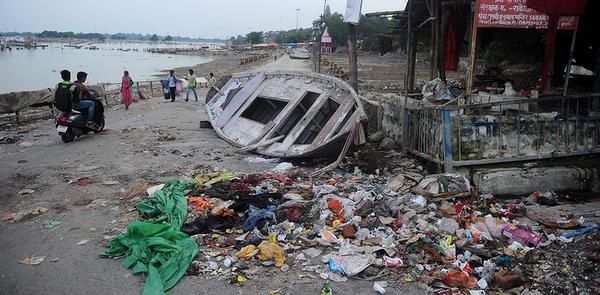Cabinet Gives Clean Ganga Mission Power to Fine Polluters
Published on by Water Network Research, Official research team of The Water Network in Government
The Union Cabinet has approved changes allowing the National Mission for Clean Ganga to fine those responsible for polluting the river.
Earlier this power was vested solely with the Central Pollution Control Board.

“We wanted powers of the Environment Protection Act,” said Water Resources Minister Uma Bharti. “This will help us tackle 22 drains responsible for 90% of the pollution of the river.”
The Rs. 20,000-crore National Mission for Clean Ganga (NMCG) is among the flagship initiatives of the government and though at least 230 projects have been sanctioned this year there is very little progress on the ground in various States along the river such as Uttar Pradesh, West Bengal, Bihar and Uttarakhand among others.
The bulk of the river cleaning projects involve setting up of sewage treatment plants, installing trash skimmers and beautifying the ghats.
Registered society
The NMCG has been a registered society since 2012 and its role is largely to fund projects to implementing organisations. It didn’t have legal powers to “tackle various threats” or issue directions to polluters.
“The mission was grossly ill-equipped to handle such expectations,” said a press note by the Water Ministry accompanying the Union Cabinet order.
The NMCG, which now has the status of an Authority, will have a two-tier management structure with a governing council to be chaired by a Director General. There will also be State-level committees.
“A key focus of the authority will be maintaining required ecological flows in the Ganga with the aim of ensuring water quality and environmentally sustainable development,” said Ms. Bharti.
Source: The Hindu
Media
Taxonomy
- River Studies
- Pollution
- River Engineering
- River Restoration
- Government
- Regulations
2 Comments
-
Please exercise your powers equally and severely, with same intent on Polluters which belong to Industries, Institutions and ULB categories...If a municipal corporation is unable to operate its collection, transport and treatment of STP and dares allow untreated or partially treated sewage into the River System, sure it should be fined on per day basis with assessment of the volume of pollutants.
The law enforcement agencies including State PCB, Police, District Authorities must also be taken to trask for turning a blind eye to pollution of River System...Why Drains should have all the industrial and municipal pollutants collected for transport into the next state..and why should any state accept the discharge of Drains with loads of pollutants into its area. Each District and State should ensure that Pollutants are treated with in their boundary limits just like Zero LD discipline is put on Industry and Institutional users of water.
1 Comment reply
-
We agree with you, but cities have their sub treatment plant in each and every township, large housing society where STP is mandatory. After formatting society it is hand over to members, and they don't take the plant functionally. Untreated Sewage is drawn daily million of litres in public sever line,which can't be treat in the existing STP of public sector.
..
-
-
If every state start vigilance visit to township, large housing society. 99℅ society will be found faulty. Once same of they have been issued notice. Other will follow the rule and operative their Sewage treatment plant, that will help to flow up the river with treated water.
1 Comment reply
-
The most significant weakness is the failure to involve communities in this process. Can a GoI bureaucrat solve a local problem? What about fecal sludge from millions of on site systems that affect quality of life of ordinary citizens
-